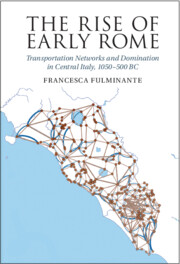Book contents
- The Rise of Early Rome
- The Rise of Early Rome
- Copyright page
- Dedication
- Contents
- Figures
- Tables
- Acknowledgements
- Introduction
- Chapter 1 The Ancient City
- Chapter 2 Transportation Infrastructures
- Chapter 3 Data and Methodology
- Chapter 4 Network Analysis Centrality Indexes
- Chapter 5 Network Analysis Efficiency Indexes
- Chapter 6 Multi-scale Analysis Based on Least-Cost Paths
- Chapter 7 Modelling
- Conclusions
- Data, Mathematical Explanations and Calculations
- Notes
- Bibliography
- Index
Introduction
Published online by Cambridge University Press: 17 August 2023
- The Rise of Early Rome
- The Rise of Early Rome
- Copyright page
- Dedication
- Contents
- Figures
- Tables
- Acknowledgements
- Introduction
- Chapter 1 The Ancient City
- Chapter 2 Transportation Infrastructures
- Chapter 3 Data and Methodology
- Chapter 4 Network Analysis Centrality Indexes
- Chapter 5 Network Analysis Efficiency Indexes
- Chapter 6 Multi-scale Analysis Based on Least-Cost Paths
- Chapter 7 Modelling
- Conclusions
- Data, Mathematical Explanations and Calculations
- Notes
- Bibliography
- Index
Summary
Urbanism in the past and present remains hotly debated in academia and the media (we could mention the Copenhagen Polis Centre project; the Reception of the City in Late Antiquity European Research Council project, Cambridge; the UrbNet project, Aarhus; the Social Reactors Project, Colorado; the OIKOS Dutch network; and the Cities series published by the Guardian in the UK media). What is an ancient city? When can we say that a nucleated settlement has become a city? Why does a city sometime prevail over others and why does it eventually decline? These questions are matters for lively debate that have not yet been answered definitively, especially with reference to central Italy and Rome in particular. The long-term trajectory of Rome is quite well known and established from the early supremacy within Latium vetus in pre-historic and early historic times, to the emerging power in Italy, during the Republican period, and finally the dominance over the Empire, in the first few centuries of the last millennium before the final collapse around the end of the fourth century ad.
- Type
- Chapter
- Information
- The Rise of Early RomeTransportation Networks and Domination in Central Italy, 1050–500 BC, pp. 1 - 7Publisher: Cambridge University PressPrint publication year: 2023



